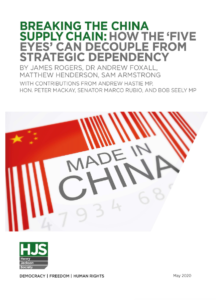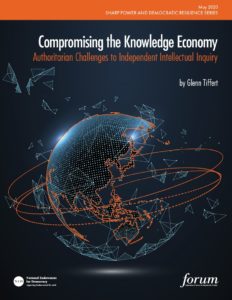
Henry Jackson Society
As the case of an Australian student, 20-year-old Drew Pavlou, who carried on a program of activism including stunts like posting a “Covid-19 Biohazard” warning in front of his university’s Confucius Institute—the local branch of a Beijing-funded “soft power” program – demonstrates, the moral and reputational damage of mishandling a relationship with China can be ruinous, argues Walter Russell Mead.
Open debate about topics like Hong Kong, Taiwan, Xinjiang and Tibet shouldn’t be suppressed simply because a foreign government objects. And if any students are to be expelled for violations of university standards, it shouldn’t be peaceful protesters, but conscious agents of a foreign police state who abuse their university status to snoop on their peers, he writes for the Wall Street Journal (HT:FDD).
Alexander Norman’s The Dalai Lama: An Extraordinary Life lifts the veil on the Dalai Lama’s spiritual role, showing how it has informed both his political efforts and the Chinese Communist Party’s efforts to exploit controversies within Tibetan Bhuddism, notes Ellen Bork, a visiting fellow at The Project 2049 Institute.
 Arguably, the Dalai Lama took an even more revolutionary step by ending Tibet’s theocracy, she writes for The American Interest:
Arguably, the Dalai Lama took an even more revolutionary step by ending Tibet’s theocracy, she writes for The American Interest:
In 2011, he transferred his political authority to the government elected from among Tibet’s diaspora. This is not so much the retirement that has been reported but a transformation that has underappreciated implications for responding to the the People’s Republic of China’s (PRC) assertion of anti-democratic norms in its quest for global influence. As for the future of his religious office, he rejects any Chinese role in determining his successor as a contradiction of communist ideology and contrary to the requirements of reincarnation.
 A recent National Endowment for Democracy report by the Hoover Institute’s Glenn Tiffert, titled “Compromising the Knowledge Economy: Authoritarian Challenges to Independent Intellectual Inquiry,” examines the various ways that “authoritarian regimes—primarily China, but also Russia, Saudi Arabia, Turkey, and others—are exploiting unanticipated vulnerabilities in open knowledge economies to challenge free intellectual inquiry from the inside,” Sophie Beach writes for China Digital Times.
A recent National Endowment for Democracy report by the Hoover Institute’s Glenn Tiffert, titled “Compromising the Knowledge Economy: Authoritarian Challenges to Independent Intellectual Inquiry,” examines the various ways that “authoritarian regimes—primarily China, but also Russia, Saudi Arabia, Turkey, and others—are exploiting unanticipated vulnerabilities in open knowledge economies to challenge free intellectual inquiry from the inside,” Sophie Beach writes for China Digital Times.
The report focuses on China to look at how intensified government control over academia and intellectual freedom domestically is being expanded outward in an effort to influence and control research and perceptions of China globally.







